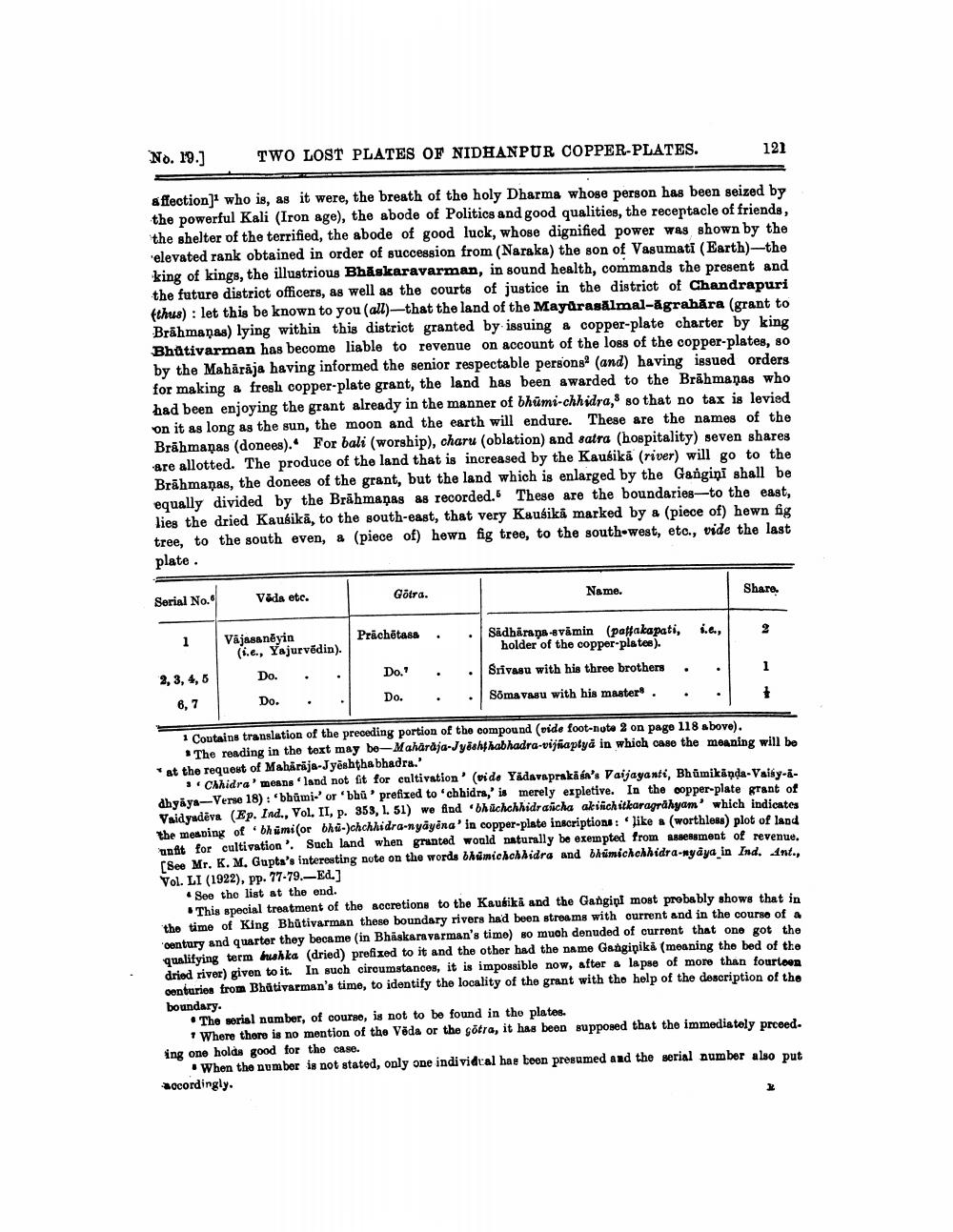________________
No. 19.]
TWO LOST PLATES OF NIDHANPUR COPPER-PLATES.
affection] who is, as it were, the breath of the holy Dharma whose person has been seized by the powerful Kali (Iron age), the abode of Politics and good qualities, the receptacle of friends, the shelter of the terrified, the abode of good luck, whose dignified power was shown by the elevated rank obtained in order of succession from (Naraka) the son of Vasumati (Earth)-the king of kings, the illustrious Bhaskaravarman, in sound health, commands the present and the future district officers, as well as the courts of justice in the district of Chandrapuri (thus): let this be known to you (all)-that the land of the Mayurasälmal-agrahāra (grant to Brahmanas) lying within this district granted by issuing a copper-plate charter by king Bhütivarman has become liable to revenue on account of the loss of the copper-plates, so by the Mahārāja having informed the senior respectable persons (and) having issued orders for making a fresh copper-plate grant, the land has been awarded to the Brahmanas who had been enjoying the grant already in the manner of bhumi-chhidra,3 so that no tax is levied on it as long as the sun, the moon and the earth will endure. These are the names of the Brahmanas (donees). For bali (worship), charu (oblation) and satra (hospitality) seven shares are allotted. The produce of the land that is increased by the Kausika (river) will go to the Brahmanas, the donees of the grant, but the land which is enlarged by the Gangini shall be equally divided by the Brahmanas as recorded. These are the boundaries-to the east, lies the dried Kausika, to the south-east, that very Kausika marked by a (piece of) hewn fig tree, to the south even, a (piece of) hewn fig tree, to the south-west, etc., vide the last plate.
Serial No.
1
2, 3, 4, 5
6,7
Väda etc.
Vājasaneyin (i.e., Yajurvēdin).
Do.
Do.
Gōtra.
Prächētasa
Do." Do.
•
Name.
Sadharana-svamin (pattakapati, i.e., holder of the copper-plates).
Srivasu with his three brothers Soma vasu with his masters.
.
121
Share.
+
1 Coutains translation of the preceding portion of the compound (vide foot-note 2 on page 118 above). The reading in the text may be-Maharaja-Jyeshthabhadra-vijñaptyd in which case the meaning will be at the request of Maharaja-Jyeshtha bhadra."
Chhidra' means 'land not fit for cultivation' (vide Yadavaprakasa's Vaijayanti, Bhumikanda-Vaisy-ādhyaya-Verse 18): 'bhümi-' or 'bhü' prefixed to 'chhidra,' is merely expletive. In the copper-plate grant of Vaidyadeva (Ep. Ind., Vol. II, p. 353, 1. 51) we find 'bhüchchhidraucha akiñchitkaragrahyam' which indicates the meaning of bhumi (or bhu-)chchhidra-nyayêna' in copper-plate inscriptions: like a (worthless) plot of land unfit for cultivation. Such land when granted would naturally be exempted from assessment of revenue. [See Mr. K. M. Gupta's interesting note on the words bhumichchhidra and bhumichchhidra-nyaya in Ind. Ant., Vol. LI (1922), pp. 77-79.-Ed.]
See the list at the end.
This special treatment of the accretions to the Kausika and the Gangipl most probably shows that in the time of King Bhütivarman these boundary rivers had been streams with current and in the course of a century and quarter they became (in Bhaskaravarman's time) so much denuded of current that one got the qualifying term bushka (dried) prefixed to it and the other had the name Gangipika (meaning the bed of the dried river) given to it. In such circumstances, it is impossible now, after a lapse of more than fourteen centuries from Bhütivarman's time, to identify the locality of the grant with the help of the description of the boundary.
The serial number, of course, is not to be found in the plates.
Where there is no mention of the Veda or the çötra, it has been supposed that the immediately prceed. ing one holds good for the case.
When the number is not stated, only one individual has been presumed and the serial number also put accordingly.




